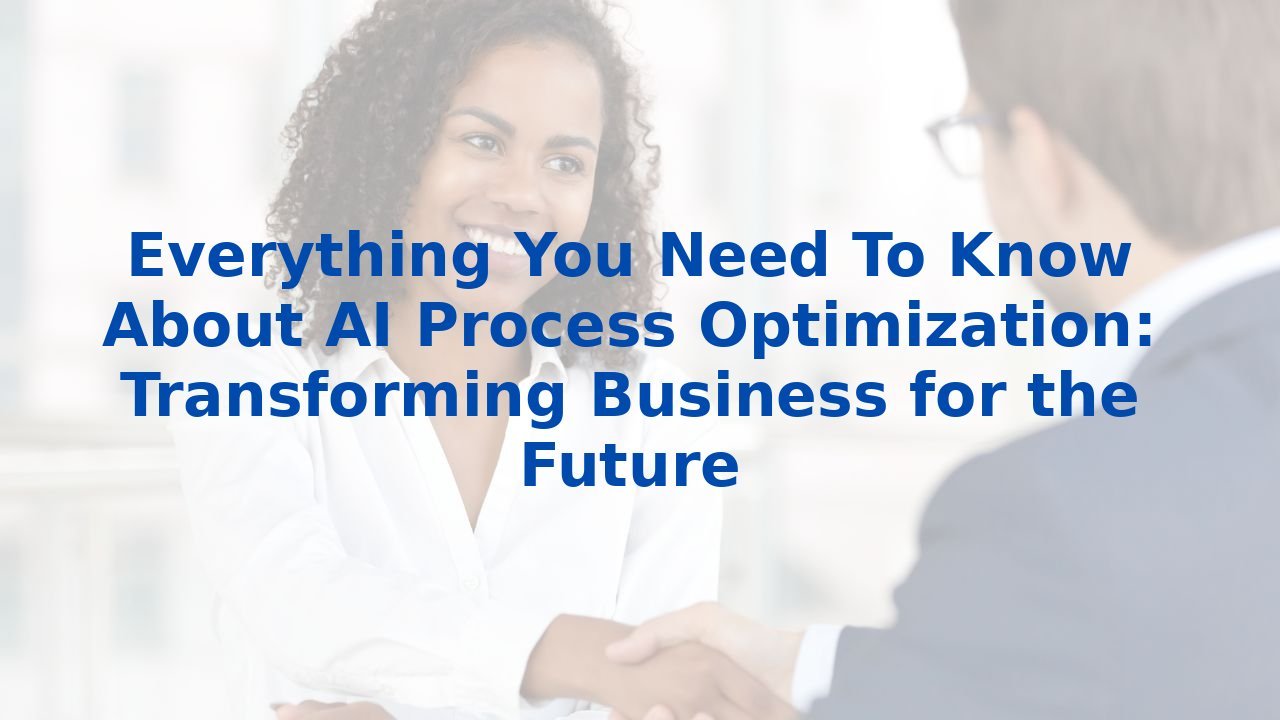Everything You Need To Know About AI Process Optimization: Transforming Business for the Future
Everything You Need To Know About AI Process Optimization: Transforming Business for the Future
Introduction
In a world where speed, efficiency, and adaptability dictate success, artificial intelligence (AI) emerges as an indispensable ally for businesses. From automating repetitive tasks to enhancing decision-making capabilities, AI revolutionizes how organizations operate, ensuring they stay ahead in the competition. This blog post explores the myriad ways AI can optimize business processes while also emphasizing the importance of equipping your workforce with the skills necessary to harness its full potential.
What is AI Process Optimization?
At its core, AI process optimization combines advanced technologies, such as machine learning, to refine and elevate business process management. By analyzing data patterns and automating tasks, organizations can significantly reduce errors and enhance productivity, ultimately boosting their operational efficiency.
Key Benefits of AI in Business Process Management
1. Automating Routine Tasks
Imagine a world where your team members are liberated from the drudgery of high-volume tasks like document processing. AI-enabled solutions can automate these activities, allowing your talent to focus on strategic initiatives that drive growth. By implementing intelligent document processing, businesses can effortlessly convert complex documents into actionable data without manual intervention.
2. Improving Decision Making
With AI, decision-making transforms from guesswork into a data-informed process. By unveiling trends, predicting outcomes, and identifying root causes, AI facilitates faster and more accurate decisions. This empowers businesses to generate simulations, helping them visualize how pricing changes may impact overall profitability—an invaluable tool for agile business strategies.
3. Enhancing Customer Experience
AI doesn’t just optimize internal processes; it amplifies the customer journey too. Customer service departments benefit greatly from AI’s ability to analyze incoming requests and automate responses through AI-driven chatbots. These systems not only provide immediate assistance but also extract and input essential information into ticketing systems, streamlining customer interaction.
4. Optimizing Supply Chain Management
In supply chain management, AI acts as a sentinel, analyzing purchase data in real-time to detect anomalies and alerting purchasing teams to potential issues. Through robotic process automation, AI can also seamlessly connect with supplier systems, automating the ordering process and driving operational efficiency.
5. Supporting HR Functions
Human Resources can leverage AI to enhance objectivity and improve employee experiences. AI technology can synthesize complex data points, such as performance metrics, budget constraints, and market trends, to aid HR in crafting fair and competitive salary offers.
6. Enhancing Sales Processes
For sales teams, AI optimizes their workflows by automating administrative tasks and recommending the most effective sales channels. It identifies upsell opportunities and prioritizes leads, maximizing sales efficiency and driving increased revenue.
The Role of AI in Business Process Management
AI’s impact is multifaceted, engaging in three core components: data analysis, process building, and automation.
1. Data Analysis
AI analyzes vast datasets to furnish leaders with actionable insights that inform both tactical and strategic decisions. By revealing patterns and forecasting potential outcomes, businesses are better equipped to make informed choices.
2. Process Building
AI not only improves existing processes but is also capable of creating entirely new workflows. By assessing user parameters and historical data, it ensures processes are built for optimal efficiency from the ground up.
3. Automation
By automating manual tasks like data entry and document processing, AI liberates human resources and reduces the likelihood of human error, paving the way for enhanced productivity.
How AI Enhances Business Processes
1. Process Discovery
AI leverages techniques like process mining to unveil inefficiencies that may not be visible through human analysis. This clarity can prompt significant enhancements in workflow.
2. Process Mapping
By generating real-time process maps, AI ensures that organizational documentation is always accurate and reflective of current operational dynamics, allowing teams to pivot quickly when necessary.
3. Process Improvement
Through continuous monitoring and predictive modeling, AI drives long-term process improvements. It empowers businesses to identify and rectify issues before they escalate, ensuring sustained organizational success.
The Benefits of Training Employees for AI
While the capabilities of AI are transformative, the effectiveness of these tools is contingent upon the skills of the workforce. Training employees in AI fosters:
- Understanding AI Systems: Employees equipped with AI knowledge can skillfully integrate its capabilities into existing processes, maximizing its potential and avoiding pitfalls.
- Operating AI Tools: Proficiency in AI tools enables teams to automate tasks, analyze data effectively, and derive valuable insights that enhance decision-making.
- Interpreting AI Insights: As businesses rely more on AI-generated insights, it’s crucial for employees to interpret them correctly to drive informed action.
- Collaborating with AI Systems: Training fosters teamwork between employees and AI tools, facilitating seamless collaboration that takes advantage of both human intellect and machine efficiency.
Conclusion
AI is no longer a futuristic concept—it is a present-day necessity for businesses striving for optimization across their processes. By embracing AI, organizations can streamline operations, enhance customer satisfaction, and empower their workforce through targeted training initiatives. In a rapidly changing market landscape, integrating AI into your operational fabric is not just an advantage; it’s a pathway to lasting success.
For those looking to deepen their understanding and capabilities with AI, explore resources and training options designed to equip your entire workforce with essential AI skills.



